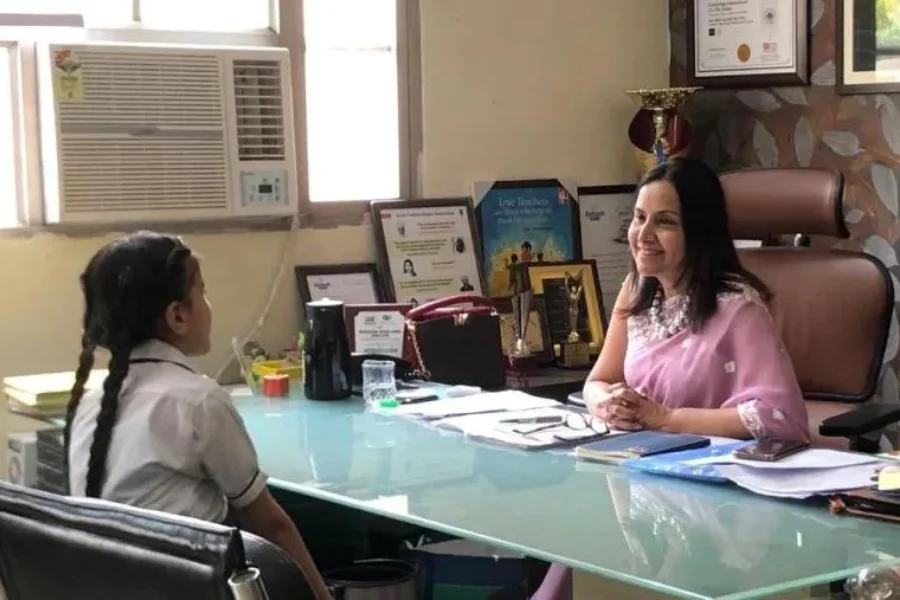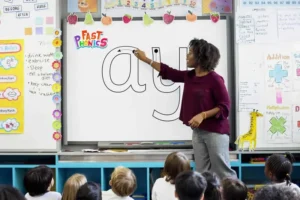
Source: gcu
A structured, engaging, and disciplined learning environment is required to effectively educate young children in preschool. Certain crucial Skills for Classroom Management help teachers foster a positive learning atmosphere, maintain discipline, and encourage student participation. It includes establishing clear expectations, encouraging students’ involvement with appealing activities, organization skills, eloquent communication, and decision-making skills to resolve conflicts in the class. Developing essential skills benefits teachers and, ultimately, students to stay focused and organized in learning.
Get details of our Education Management Course, Call / Whatsapp on +919869546913 / +919869866277.
Click Here, to download Education Management Course brochure.
What are the Essential Skills for Classroom Management?
A productive Classroom Learning Environment of a preschool stands on the foundation of effective management. Educators with organization and operational skills lead a successful class throughout the year. Apart from these skills, various other techniques help an educator to create an inclusive learning atmosphere.
Let’s explore the essential skills for effective classroom management:
Clear Communication
Giving precise instructions reduces confusion and keeps students focused. Active listening helps in understanding student needs and addressing concerns. Using nonverbal cues like gestures and eye contact strengthens relationships with children.
Uniformity in Expectations and Consequences
Enforcing clear rules helps maintain impartiality and discipline. Providing logical consequences teaches responsibility and accountability among children. Skills of organization and management lead to disciple
Classroom Organization
Structuring the physical space for accessibility and minimal distractions. Arranging seating to encourage participation and collaboration. Keeping materials and resources organized for smooth lesson transitions.
Effective Time Management
Starting and ending lessons on time maintains momentum. Allocating time for different activities prevents rush or boredom. Using timers and schedules helps students stay on track.
Student Involvement Techniques
Creating a lesson plan and educational activities that appeal to young children and drive their participation is important for class engagement. Teachers should apply strategies that help children stay focused on learning without being distracted.
Classroom Authority and Presence
Using a confident and calm tone to establish control. Setting a positive example through professional behavior. Balancing authority with approachability to build trust.
Conflict Resolution Skills
The ability to solve disagreements to restore harmony in the classroom is crucial. Address conflicts calmly and empirically to maintain a respectful environment. Teachers encourage students to express their concerns and find solutions logically.
Flexibility and Adaptability
Adjusting teaching strategies based on student responses and needs. Being open to unexpected changes without losing control of the class. Modifying
Encouraging Good Behavior
Creating a classroom atmosphere that uplifts the positive works of children is an important skill. With praise and rewards, educators should reinforce good behavior in students and encourage them to continue their positive actions.
Emotionally Intellectual
Managing personal stress to avoid reacting negatively in challenging situations. Building strong teacher-student relationships with compassion and responsiveness makes children feel valued.
Mastering these crucial Skills for Classroom Management is necessary for every educator who wants to shine in teaching and early education.

Source: medium
Tips for Effective Classroom Management?
Managing a classroom consisting of students under the age of six years might be strenuous, but a skilled educator applies thought-provoking Strategies and Manages the class effectively. The techniques include a combination of organization, discipline, and clear communication.
Here is a summary of Tips for Effective Classroom Management:
Set Clear Expectations in the class
To create an organized learning atmosphere, establishing rules and practices from the beginning is crucial. Clear expectations lead to an organized approach to working, and students understand their responsibilities at an early age. Strengthen rules to maintain equality and discipline.
Build Positive Relationships
Developing positive relationships with students with empathy to foster a supportive classroom atmosphere is an effective approach to managing young children. Use positive reinforcement to inspire involvement and good behavior.
Keep Students Engaged
Use interactive teaching methods, such as discussions and group activities. Incorporate movement and variety to maintain focus. To increase relevance and interest, connect lessons to real-world situations.
Stay Organized and Equipped
Plan lessons to ensure smooth transitions between activities. Keep classroom materials easily accessible to minimize disruptions. Have backup activities ready in case of unexpected changes.
Remain Calm and Consistent
Handle disruptions with a composed and professional approach. Enforce consequences fairly without favoritism. Adapt strategies when necessary while maintaining structure. Applying these tips smartly and developing Skills for Classroom Management will offer a rewarding experience of teaching young students.

Source: cia
School Administration Management Course
Aspiring teachers determined to strengthen their management and administrative capabilities should explore the online School Administration Management Course from a reputed institute, Vidhyanidhi Education Society (Govt. Regd.) and operational for the last 15 years. This program aims to offer current school administrative strategies and management techniques that enable future administrators to provide superior services to children, parents, and teachers. If you are wondering if online learning is a good option, here are some exceptional benefits that make it worth it.
Flexibility for learning
With pre-recorded lectures provided by VES, aspirants can complete the course in their own space at any time without disrupting other commitments. This approach saves time and money, providing equivalent knowledge as compared to offline batches.
Comprehensive syllabus
The course content is extremely easy to understand and covers important school administration topics like leadership, staff management, curriculum planning, and discipline strategies.
Assistance from qualified trainers
Enrollees gain expert guidance and support throughout the course from experienced trainers. They provide constructive feedback and profound knowledge.
Improved Leadership and Organizational Skills
With the School Administration Management Course, Participants develop management and strong decision-making abilities, which are beneficial for managing a school administrative department.
Globally recognized Certification
Upon completion of the program, participants receive a certification that offers immense job opportunities and leads to career growth in the education sector.
The School Administration Management Course is the ideal program to learn about operational knowledge and management techniques of an educational institute.
Join Vidhyanidhi’s Education Management Course today, and shine bright in the educational sector!
Get details of our Education Management Course, Call / Whatsapp on +919869546913 / +919869866277.
Click Here, to download Education Management Course brochure.
Education Management Course
FAQs
Which is an Effective Way of Classroom Management?
To effectively manage a class, teachers should encourage organization, establish precise rules of discipline, and uplift positive behaviors in children.
How to Control a Class Without Punishment?
A class can be managed effectively with proper organization, establishing clear rules, and maintaining positivity without applying punishment.
What is the ABC of Classroom Management?
ABC of Antecedent, Behavior, and Consequence, is the pattern to interpret the behaviors of children, their response, and what are the outcomes.



